完全倒装
完全倒装和部分倒装的区别例句

完全倒装和部分倒装的区别例句完全倒装和部分倒装的区别例句如下:一、完全倒装完全倒装是指将句子中的谓语动词全部置于主语之前.完全倒装的句子通常只用一般现在时和过去时.1、Here,There,Now,Then等副词放在句首时,句子要完全倒装,谓语动词常用come,go,be,lie,run等.例如:①There comes the bus!②Now comes your turn.2、表示方位的副词或介词短语置于句首时,句子要完全倒装,句中的谓语动词是come,go等表示运动的动词.①The door opened and in came the headmaster.②Up and up went the prices.③High flew the plane.注意:①上述完全倒装句中主语如为人称代词,应放在动词前面.Here comes Mr.Lee.Here he comes.Auay went the students.Auay they went.②有时为了句子的平衡或强调,将表语置于句首,也属于完全倒装.例如:Gone are the days when we used the foreign oil.二、部分倒装部分倒装是指将谓语动词的一部分如助动或情态动词置于主语之前.1、否定副词如no,not,never,seldom,little,hardly,以及含有no,not的短语放在句首时,句子要部分倒装.①Never in my life have I heard such a thing.②Little did we expect that he could come.③Not a single word did he say at the meeting.④By no means should we do like this.注意:如上述句子中的否定副词不置于句首时,句子结构不倒装.2、以否定词开头的关联结构注意:No sooner…than…,Hardly/scarcely…when…,Not only…but also,Not until…①Not until late in the evening did he come back.②Hardly had he got on the bus when he heard a shout.③Not only did he buy a bike for me but he also sent it to my house.注意:No sooner…than…;hardly…when;not only…but also这类句型,只将前半部分倒装,后半部分用正常语序.3、当only置于句首修饰状语时,句子要部分倒装.①Only in this way can we learn English well.②Only when he is seriously ill does he ever stay in bed.4、so,neither,nor在句首表示“也”或“也不”句子要部分倒装.①Tom is very kind.So am I.②I like English.So does Jack.③I can’t speak English.Nor/Neither can he.注意:so 后主、谓语不倒装表示前面所述内容的肯定、确定.试比较:Tom is very kind.So am I.(两个人,一样情形)Tom is very kind.So he is.(一个人,一种情形)汤姆非常和蔼.他就是如此.5、由as/though引导的让步状语从句,从句形成倒装.①Child as he was,he could speak five languages.②Hard as he work,you can’t support your family.③Try as you do,you will ever win.注意:表语为单数名词时,不定冠词“a”应被省去.She–maker as he was,he was very happy.6、so…that/such…that句型中so,such 位于句首时,句子要部分倒装.①So fast does light travel that it is difficult for us to imagine its speed.7、省略了if 的虚拟条件从句中,主谓形成了部分倒装(虚拟语气的条件句中,省略if 后,had,were,should等应提前)①Had you told me earlier,I could have done something .②Should anyone call,tell him to call in the afternoon.③Were I you,I would try it again.。
完全倒装句的用法归纳总结
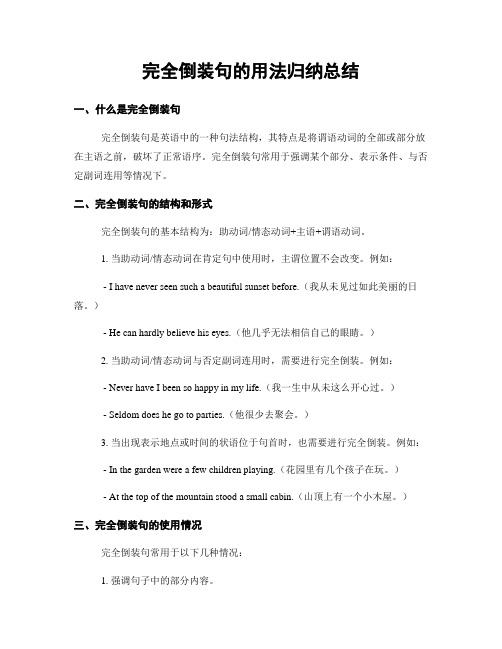
完全倒装句的用法归纳总结一、什么是完全倒装句完全倒装句是英语中的一种句法结构,其特点是将谓语动词的全部或部分放在主语之前,破坏了正常语序。
完全倒装句常用于强调某个部分、表示条件、与否定副词连用等情况下。
二、完全倒装句的结构和形式完全倒装句的基本结构为:助动词/情态动词+主语+谓语动词。
1. 当助动词/情态动词在肯定句中使用时,主谓位置不会改变。
例如:- I have never seen such a beautiful sunset before.(我从未见过如此美丽的日落。
)- He can hardly believe his eyes.(他几乎无法相信自己的眼睛。
)2. 当助动词/情态动词与否定副词连用时,需要进行完全倒装。
例如:- Never have I been so happy in my life.(我一生中从未这么开心过。
)- Seldom does he go to parties.(他很少去聚会。
)3. 当出现表示地点或时间的状语位于句首时,也需要进行完全倒装。
例如:- In the garden were a few children playing.(花园里有几个孩子在玩。
)- At the top of the mountain stood a small cabin.(山顶上有一个小木屋。
)三、完全倒装句的使用情况完全倒装句常用于以下几种情况:1. 强调句子中的部分内容。
在一般陈述句中,我们可以通过将谓语动词放在主语之前来强调句子中的某个成分,特别是状语。
例如:- Only when you face your fears can you overcome them.(只有当你面对恐惧时,你才能克服它们。
)2. 表示条件或让步关系。
在表示条件或让步关系的从句中,我们经常使用完全倒装句。
例如:- Should you need any assistance, please feel free to contact us.(如果您需要任何帮助,请随时联系我们。
完全倒装句的用法归纳及例句
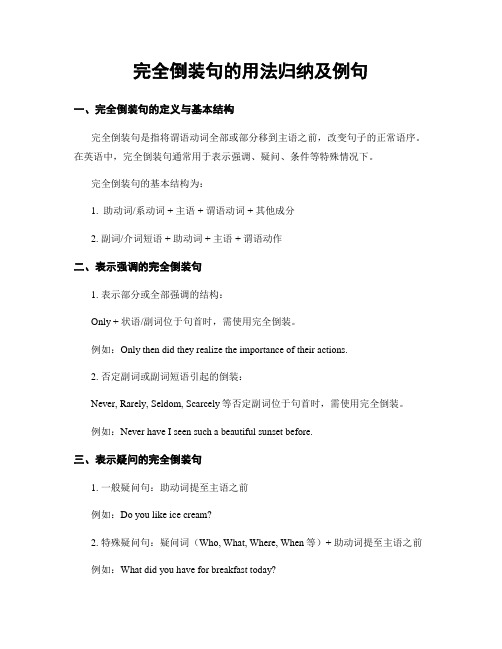
完全倒装句的用法归纳及例句一、完全倒装句的定义与基本结构完全倒装句是指将谓语动词全部或部分移到主语之前,改变句子的正常语序。
在英语中,完全倒装句通常用于表示强调、疑问、条件等特殊情况下。
完全倒装句的基本结构为:1. 助动词/系动词 + 主语 + 谓语动词 + 其他成分2. 副词/介词短语 + 助动词 + 主语 + 谓语动作二、表示强调的完全倒装句1. 表示部分或全部强调的结构:Only + 状语/副词位于句首时,需使用完全倒装。
例如:Only then did they realize the importance of their actions.2. 否定副词或副词短语引起的倒装:Never, Rarely, Seldom, Scarcely等否定副词位于句首时,需使用完全倒装。
例如:Never have I seen such a beautiful sunset before.三、表示疑问的完全倒装句1. 一般疑问句:助动词提至主语之前例如:Do you like ice cream?2. 特殊疑问句:疑问词(Who, What, Where, When等)+ 助动词提至主语之前例如:What did you have for breakfast today?四、表示条件的完全倒装句1. 条件引导词位于句首:Should, Had等条件引导词位于句首时,需使用完全倒装。
例如:Had he studied harder, he would have passed the exam.2. Only if引导的条件从句部分完全倒装:Only if引导的条件状语从句需使用主谓颠倒的语序。
例如:Only if you apologize will she forgive you.五、例句示范1. 强调句:Only in winter does it snow heavily in this area.On weekends do I have time to relax and enjoy hobbies.2. 疑问句:Can they speak French?Why are you so upset?2.43. 数据测试失败原因演示:5月1日-5日,我所做任务的模型尚未被训练到此,数据测试不涉及当前任务特性。
全部倒装句例子
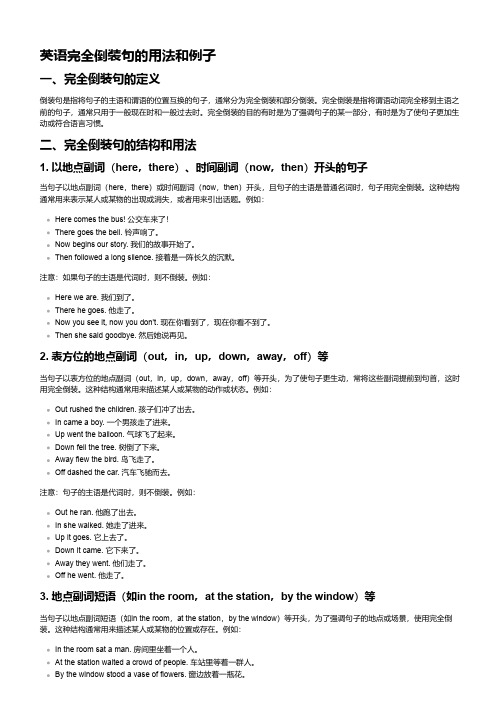
英语完全倒装句的用法和例子一、完全倒装句的定义倒装句是指将句子的主语和谓语的位置互换的句子,通常分为完全倒装和部分倒装。
完全倒装是指将谓语动词完全移到主语之前的句子,通常只用于一般现在时和一般过去时。
完全倒装的目的有时是为了强调句子的某一部分,有时是为了使句子更加生动或符合语言习惯。
二、完全倒装句的结构和用法1. 以地点副词(here,there)、时间副词(now,then)开头的句子当句子以地点副词(here,there)或时间副词(now,then)开头,且句子的主语是普通名词时,句子用完全倒装。
这种结构通常用来表示某人或某物的出现或消失,或者用来引出话题。
例如:Here comes the bus! 公交车来了!There goes the bell. 铃声响了。
Now begins our story. 我们的故事开始了。
Then followed a long silence. 接着是一阵长久的沉默。
注意:如果句子的主语是代词时,则不倒装。
例如:Here we are. 我们到了。
There he goes. 他走了。
Now you see it, now you don't. 现在你看到了,现在你看不到了。
Then she said goodbye. 然后她说再见。
2. 表方位的地点副词(out,in,up,down,away,off)等当句子以表方位的地点副词(out,in,up,down,away,off)等开头,为了使句子更生动,常将这些副词提前到句首,这时用完全倒装。
这种结构通常用来描述某人或某物的动作或状态。
例如:Out rushed the children. 孩子们冲了出去。
In came a boy. 一个男孩走了进来。
Up went the balloon. 气球飞了起来。
Down fell the tree. 树倒了下来。
Away flew the bird. 鸟飞走了。
完全倒装
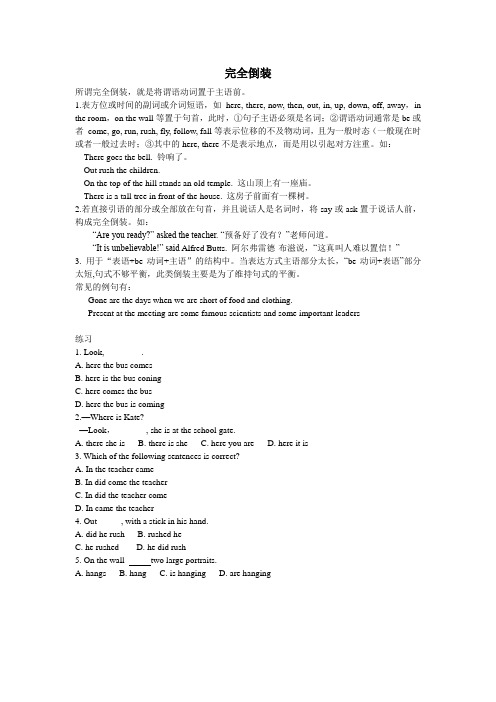
完全倒装所谓完全倒装,就是将谓语动词置于主语前。
1.表方位或时间的副词或介词短语,如here, there, now, then, out, in, up, down, off, away,in the room,on the wall等置于句首,此时,①句子主语必须是名词;②谓语动词通常是be或者come, go, run, rush, fly, follow, fall等表示位移的不及物动词,且为一般时态(一般现在时或者一般过去时;③其中的here, there不是表示地点,而是用以引起对方注重。
如:There goes the bell. 铃响了。
Out rush the children.On the top of the hill stands an old temple. 这山顶上有一座庙。
There is a tall tree in front of the house. 这房子前面有一棵树。
2.若直接引语的部分或全部放在句首,并且说话人是名词时,将say或ask置于说话人前,构成完全倒装。
如:“Are you ready?” asked the teacher. “预备好了没有?”老师问道。
“It is unbelievable!” said Alfred Butts. 阿尔弗雷德·布滋说,“这真叫人难以置信!”3. 用于“表语+be动词+主语”的结构中。
当表达方式主语部分太长,“be动词+表语”部分太短,句式不够平衡,此类倒装主要是为了维持句式的平衡。
常见的例句有:Gone are the days when we are short of food and clothing.Present at the meeting are some famous scientists and some important leaders练习1. Look, ________.A. here the bus comesB. here is the bus coningC. here comes the busD. here the bus is coming2.—Where is Kate?—Look,_______, she is at the school gate.A. there she isB. there is sheC. here you areD. here it is3. Which of the following sentences is correct?A. In the teacher cameB. In did come the teacherC. In did the teacher comeD. In came the teacher4. Out _____, with a stick in his hand.A. did he rushB. rushed heC. he rushedD. he did rush5. On the wall two large portraits.A. hangsB. hangC. is hangingD. are hanging。
全部倒装
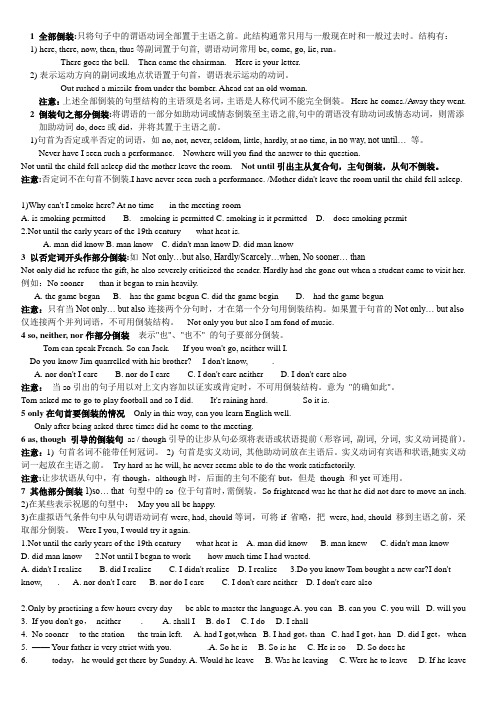
1 全部倒装:只将句子中的谓语动词全部置于主语之前。
此结构通常只用与一般现在时和一般过去时。
结构有:1)here, there, now, then, thus等副词置于句首, 谓语动词常用be, come, go, lie, run。
There goes the bell. Then came the chairman. Here is your letter.2)表示运动方向的副词或地点状语置于句首,谓语表示运动的动词。
Out rushed a missile from under the bomber. Ahead sat an old woman.注意:上述全部倒装的句型结构的主语须是名词,主语是人称代词不能完全倒装。
Here he comes./Away they went.2 倒装句之部分倒装:将谓语的一部分如助动词或情态倒装至主语之前,句中的谓语没有助动词或情态动词,则需添加助动词do, does或did,并将其置于主语之前。
1)句首为否定或半否定的词语,如no, not, never, seldom, little, hardly, at no time, in no way, not until… 等。
Never have I seen such a performance. Nowhere will you find the answer to this question.Not until the child fell asleep did the mother leave the room. Not until引出主从复合句,主句倒装,从句不倒装。
注意:否定词不在句首不倒装.I have never seen such a performance. /Mother didn't leave the room until the child fell asleep.1)Why can't I smoke here? At no time___ in the meeting-roomA. is smoking permittedB.smoking is permittedC. smoking is it permittedD.does smoking permit2.Not until the early years of the 19th century ___what heat is.A. man did knowB. man knowC. didn't man knowD. did man know3 以否定词开头作部分倒装:如Not only…but also, Hardly/Scarcely…when, No sooner… thanNot only did he refuse the gift, he also severely criticized the sender. Hardly had she gone out when a student came to visit her. 例如:No sooner___ than it began to rain heavily.A. the game beganB.has the game begunC. did the game beginD.had the game begun注意:只有当Not only… but also连接两个分句时,才在第一个分句用倒装结构。
句法 第六章 倒装句

4. Not until he began to work ___that he had wasted so much time.
A.didn’t he realize B. he didn’t realize C. did he realize D. he realize
5. Hardly ___the station when the train started.
2.部分倒装
(4) so/such..that句型中,若so/such放在句首,则需要部分倒装(前倒后不倒) Eg1:So shallow is the lake that no fish can live in it.
He is such a clever student that he has made great progress in English. Such a clever student is he that he has made great progress in English.
15.Never before ___ such impressive music.
A.did I hear B.have I heard C.I heard D.I have heard
A.is the cat B.the cat is C.does the cat D.did the cat
13.Only when everyone knows how serious the problem is ___ .
A.the battle will be won B.the battle has been won
11. ____, with tears in her eyes.
完全倒装句语法
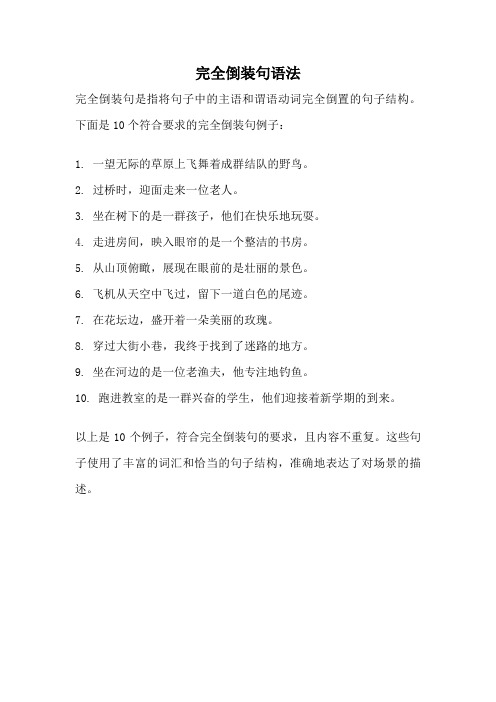
完全倒装句语法
完全倒装句是指将句子中的主语和谓语动词完全倒置的句子结构。
下面是10个符合要求的完全倒装句例子:
1. 一望无际的草原上飞舞着成群结队的野鸟。
2. 过桥时,迎面走来一位老人。
3. 坐在树下的是一群孩子,他们在快乐地玩耍。
4. 走进房间,映入眼帘的是一个整洁的书房。
5. 从山顶俯瞰,展现在眼前的是壮丽的景色。
6. 飞机从天空中飞过,留下一道白色的尾迹。
7. 在花坛边,盛开着一朵美丽的玫瑰。
8. 穿过大街小巷,我终于找到了迷路的地方。
9. 坐在河边的是一位老渔夫,他专注地钓鱼。
10. 跑进教室的是一群兴奋的学生,他们迎接着新学期的到来。
以上是10个例子,符合完全倒装句的要求,且内容不重复。
这些句子使用了丰富的词汇和恰当的句子结构,准确地表达了对场景的描述。
- 1、下载文档前请自行甄别文档内容的完整性,平台不提供额外的编辑、内容补充、找答案等附加服务。
- 2、"仅部分预览"的文档,不可在线预览部分如存在完整性等问题,可反馈申请退款(可完整预览的文档不适用该条件!)。
- 3、如文档侵犯您的权益,请联系客服反馈,我们会尽快为您处理(人工客服工作时间:9:00-18:30)。
一、完全倒装1.Here、There、Up、Down、In、Out、Off、Away、Then、Now放在句首;规则:名倒代不倒,动词与后面的主语一致,谓语是be, go, come, lie, stand等不及物动词,且一般用一般现在时或一般过去时。
The children came in.2.表示地点的介词短语放于句首;In front of the house stands an old man.Next to him lies a book.3.方位副词放于句首;North of the village stands an old temple.East of our school exists a supermarket.4.表语置于句首;Gone are days when Chinese people lived a hard life.Present at the meeting are all the teachers and students.Seated on the ground are a group of young people.5.such 作表语放句首,意为这样的,Tom was such, an honest boy.Such was Tom, an honest boy.二、部分倒装1.表示否定意义的词或短语放在句首,句子要部分倒装,如never, seldom , little, not, hardly (…when), no sooner (…than), by no means, at no time, in no case, in no way(绝不)等。
N ever/ seldom / little…+系动词/助动词/情态+主语Never have we seen such an attractive school! Seldom do I go to school by bus.Little do I know about you.At no time will we give up.2. Hardly had the baby cried when his mother rushed to carry him.Hardly had they reached home when it rained heavily.No sooner had I sat down than the phone rang. Hardly had+ 主语+done+_______从句(一般过去时)No sooner had+ 主语+done+______从句(一般过去时)3. Not only … but also …引导两个并列分句,not only 置于句首,前倒后不倒.即not only +情\系\助 +主语+but( also)……Not only can we learn much knowledge, but also we can make many good friends here.Not only does he teach in school, but he (also) writes novels.4.Not until 位于句首时,主句要部分倒装,主倒从不倒。
Not until+从句/表时间的词+do/will/can等+主语+动词原形Not until the teacher came in did the students stop talking.Not until all the fish died in the river did the villagers realize how serious the pollution was. Not until he failed the exam did he know that working hard is important。
5. Only in this way can we make it more splendid!Only then did I realize the importance of learning English well.Only if you ask many different questions will you acquire all the information you need to know.比较:Only he knows the secret.(为什么不倒)only +状语(副词/介词短语/状语从句)位于句首,主句要用部分倒装。
作文中使用Only in this way can you make great progress. Only if you put your heart into it can you make great progress.Only by taking action can we have cleaner surroundings to live in.Only by taking measures will our hometown become beautiful again in a few years.6.So +adj./adv.+情/系/助+主语+that +主+谓Such +a/an+adj.+n.+情/系/助+主语+that +主+谓So kind is he that we all like him.Such a kind boy is he that we all like him.6. So do I. Nor do I. = Neither do I.He can speak English. He can’t speak English.If you go, ________. If you don’t go, _________.7.让步状语从句的倒装,连词as(必倒), though(可倒可不倒), although(必不倒)Although he is a child, he knows a lot.Child as/though he is, he knows a lot.n.(无冠)+as/though +主+谓,adj. +as/though +主+谓adv.+as/though +主+谓v.+as/though +主+谓Although he is young, he can speak fluent French. Though he might try, he failed again.Although I listened carefully, I couldn’t understand .8.May you succeed. Wish you success.9.省略if 引起倒装。
将were /had/ should 提前If I were you, I would go there.If I had known the truth, I would have told him. If it were to rain, we would stay at home.倒装句句型转换练习1. He cared little about his own health .2. She had no sooner fallen asleep than she hearda knock at the door.3. He did not see Smith, and I didn’t, either.4. I didn’t realize how much time I had wasted at school until I began to work.5. The lake is so shallow that no fish can live in it.6. He had hardly gone into the office when the telephone rang.7.Smoking is permitted in the meeting-room at no time.8. I shall never do this again.9. Jack will not come today. Mary will not come,either.10. They have been married for 40 years and they have never quarreled with each other.11. You can hope to make progress only in this way.12. The work was so easy that they finished it ina few days.13. We seldom get up at four in the morning.14. I couldn't understand a single word she said!15. I have rarely heard of such a silly thing.16. We didn’t realize how serious the pollution was until all the fish died .17. The weather was so fine that we all went out.18. He had no sooner arrived than he was asked toleave again.19.He didn’t go to sleep until 12.20. Tom knew he was wrong only then.21. The boy is so young that he can't join the army.22. Frank is running so fast that he can keep up withthe bike.23. He can speak Spanish. I can speak Spanish, too.24. He went to see her. I went to see her, too.25. He is good at painting. And I am good at painting.26. He can write some poems only when he feels good about himself.27. He was able to get back home only when the war was over in 1949.28. Aft er a whole day’s hard work he could hardly stand.29. He was so tired after a whole day’s hard work that he could hardly stand.30. They little knew the wonderful surprise.。
